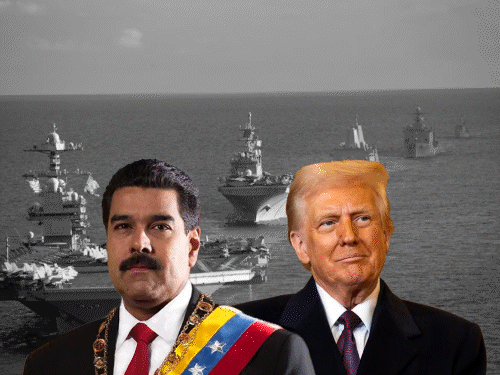Rising Tensions: The U.S. Prepares for Potential Military Action in Venezuela
Background to the Crisis
The United States is reportedly considering military action against Venezuela, with President Donald Trump contemplating strikes on drug bases and smuggling routes. This information comes amid heightened tensions and is based on reports from CNN citing White House officials.
Deployments and Military Movements
In a clear show of military readiness, U.S. Defense Secretary Pete Hegseth has ordered the USS Gerald R. Ford, the Navy’s largest aircraft carrier strike group, to be deployed from Europe to the Caribbean. This move signals a serious intent to confront what the U.S. perceives as threats emanating from Venezuela. Additionally, Trump has authorized covert CIA operations within Venezuelan territory, emphasizing a multi-faceted approach to national security.
Diplomatic Options Still on the Table
While military options are being discussed, President Trump has not entirely closed the door on diplomacy. There are indications that the U.S. is willing to engage in talks to mitigate the flow of drugs into American streets, underlining the complex nature of U.S. foreign policy regarding Venezuela.
Venezuela’s Military Readiness
In response to the perceived threat, Venezuelan President Nicolas Maduro has announced that the country has deployed 5,000 Igla-S missiles, acquired from Russia, to defend against potential U.S. strikes. Maduro has made it clear that these weapons are intended to shield the country from what he describes as “imperialist threats.”
History of U.S. Military Engagements
The relationship between the U.S. and Venezuela has been fraught with tensions and accusations, often leading to military action. Recently, U.S. military forces have engaged boats suspected of drug trafficking in international waters, resulting in casualties. According to reports, at least 43 people have perished in actions targeting Venezuelan vessels over the last month, highlighting the escalating confrontations in the Caribbean.
Allegations Against Maduro
The Trump administration has accused Maduro of being deeply involved in drug trafficking, specifically alleging that he collaborates with international drug cartels to smuggle fentanyl-laced cocaine into the U.S. As part of these efforts, the U.S. has placed substantial bounties on Maduro, recently raising the reward to an astonishing $420 million, highlighting the seriousness of these allegations.
Maduro’s Defiant Stance
Despite the external pressures, Maduro remains defiant and has previously been charged with narco-terrorism in a U.S. court. His administration has steadfastly denied all accusations, portraying them as efforts by the U.S. to undermine Venezuelan sovereignty. His government claims to be prepared to defend the nation against any violation of its airspace or territorial integrity.
Ongoing U.S. Sanctions and Economic Impacts
The U.S. has imposed a series of economic sanctions on Venezuela over the years, contributing significantly to its ongoing economic crisis. Despite once being one of the wealthiest countries in the world due to its vast oil reserves, Venezuela’s economy has plummeted. About 75% of its population now lives below the poverty line, and the country has witnessed an exodus of approximately 7.5 million citizens in recent years.
Impact of Oil Dependency
Venezuela’s reliance on oil revenues has been both a blessing and a curse. Economic downturns following falls in oil prices significantly impacted the country’s financial standing. The inability to adapt to changing global markets or effectively capitalize on rising oil prices in subsequent years has compounded its economic troubles, leading to a humanitarian crisis that reverberates through its society.
International Relations and Ongoing Diplomatic Tensions
The ongoing political rifts between the U.S. and Venezuela have historical roots, tracing back decades. Venezuela’s criticism of U.S. foreign policy and vice versa has created a backdrop of hostility. The U.S. and allied Western nations consistently accuse Maduro of electoral fraud, citing deeper issues within the Venezuelan electoral process.
This narrative presents a complex interplay of military posturing, diplomatic overtures, and long-standing socio-economic issues, underscoring the precarious situation both countries find themselves in concerning Venezuela’s future.



